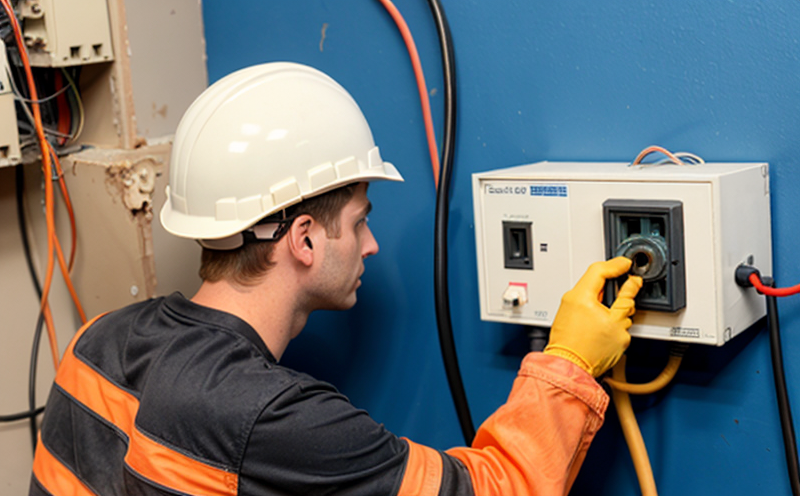IEC 60601-1 Temperature Rise Testing of Accessible Parts
The International Electrotechnical Commission (IEC) Standard 60601-1 defines the essential requirements for safety of medical electrical equipment and related electrotherapy products. Within this standard, Clause 3.4 specifically addresses temperature rise testing to ensure that accessible parts do not exceed safe limits during operation.
Temperature rise testing is critical because it helps identify potential hazards associated with overheating components, which could lead to discomfort for patients or malfunction of the device. Excessive heat can cause damage to insulation materials, leading to electrical shorts and failures. This test ensures that the medical devices meet stringent safety standards set by IEC 60601-1.
The accessible parts of a medical device are those that can be touched by users during normal operation or maintenance without tools. These areas include control panels, handles, connectors, and any other part that comes into direct contact with the user. Testing these components for temperature rise is essential to prevent burns or discomfort for patients.
During testing, the accessible parts are subjected to continuous load conditions simulating real-world use scenarios. The test apparatus consists of a calibrated heating element connected to the accessible part under test. A thermal camera and thermocouples measure the surface temperatures at various points on the component throughout the duration of the test. The temperature rise is calculated by comparing these measurements with the initial ambient temperature.
The acceptance criteria for this test are based on predefined limits specified in IEC 60601-1. Typically, the maximum allowable temperature rise is determined by the material properties and expected operating conditions of the device. Compliance ensures that the medical equipment remains safe for both healthcare professionals and patients during use.
Understanding the importance of this test requires knowledge of how it impacts various stakeholders involved in the design and manufacturing process. Quality managers need to ensure that all aspects of the product meet regulatory requirements, while compliance officers must verify that these tests are conducted correctly to avoid non-compliance issues. R&D engineers benefit from knowing the outcomes of such tests to refine their designs for better safety performance.
For procurement teams, understanding this testing ensures they select suppliers who adhere strictly to international standards like IEC 60601-1. This knowledge also helps them evaluate bids more effectively by assessing whether manufacturers have robust quality assurance processes in place.
Scope and Methodology
The scope of the temperature rise testing under IEC 60601-1 covers all accessible parts that can come into direct contact with users during normal operation or maintenance. This includes but is not limited to control panels, handles, connectors, and any other component that might be touched by patients.
- Accessible Parts: Control panels, handles, connectors
- Test Conditions: Continuous load simulating real-world use scenarios
- Instruments Used: Calibrated heating element, thermal camera, thermocouples
The methodology involves placing the accessible part under test into a controlled environment where it is exposed to continuous electrical loading. The temperature at multiple points on the component is continuously monitored using non-contact infrared thermometers and contact thermocouples. These instruments provide precise measurements of how much the temperature increases above ambient conditions during operation.
The duration of the test depends on the specific requirements outlined in IEC 60601-1 for each type of medical device being tested. Generally, it ranges from several minutes to an hour or more, depending on the expected operating life and peak power consumption of the equipment.
Eurolab Advantages
At Eurolab, our expertise in IEC 60601-1 compliant testing ensures that we provide accurate and reliable results for your temperature rise tests. Our team of experienced engineers and technicians is well versed in the latest techniques and equipment required to perform these tests effectively.
- Experienced Engineers: Trained professionals specializing in electrical safety testing
- State-of-the-Art Equipment: Advanced thermal imaging systems and precision thermocouples
- Comprehensive Reporting: Detailed reports providing all relevant data for your records
We offer a range of additional services that complement our core temperature rise testing capabilities. These include electromagnetic compatibility (EMC) testing, electrical insulation resistance measurement, and dielectric strength tests. Our comprehensive suite of services allows us to provide a one-stop solution for all your regulatory compliance needs.
Our commitment to quality extends beyond just providing accurate test results; we also ensure that our clients receive timely delivery of their reports. By maintaining strict adherence to international standards like IEC 60601-1, we guarantee that you get the highest level of service available in the industry.





